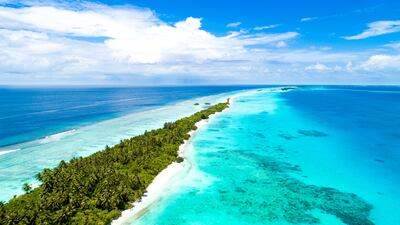The Maldives is known for its pristine shorelines and clear waters with travellers holidaying in the archipelago often able to spot sharks, turtles, manta rays more.
With thriving coral reefs, turquoise ocean and colourful marine life, not to mention having the word dive in its name, the destination is one of the world’s best scuba diving locations.
But until now, no one really knows what’s happening deep beneath the surface.
The Nekton Maldives Mission is about to change that via an ocean discovery mission on September 4 that will send a team of international divers on the first systematic survey and sampling of the Maldives from the surface to depths of up to 1,000 meters.
The 35-day operation will try to find out the status of the ocean below depths of 30 metres. It’s being carried out by UK marine research institute Nekton and the Government of the Maldives.
An all-female descent team

The first descent will be carried out by an all-female team, led by two Maldivian divers. Shafiya Naeem, director general of Maldives Marine Research Institute, who is leading the 10 Maldives scientists on the mission, and Farah Amjad, research assistant to the Nekton Maldives Mission, are part of the crew of the Nekton mission’s first descent.
Four of the 10 Maldivian scientists taking part in the mission are women.
Below the waves, divers will carry out health checks to establish the status of life in the Indian Ocean waters. The team will use two high-tech submersibles — one of which can go as deep as 1,000 meters — to help conduct their research.
With the ocean making up about 99 per cent of the Maldives, the country is threatened by rising ocean levels. At depths of about 120 metres, the dive team will locate the old beach line from 20,000 years ago. This should help in investigating how ocean life has adapted to rising sea levels.

Data collected during the dives will also be used to establish the health of the ocean, create new protected marine areas and act as a basis for other conservation projects.
Tracking the health of the island’s coral atolls and reefs and conducting the first survey and sampling of the Maldives's deep reefs is also on the agenda.

Divers will also investigate the country's shark and ray population — a critical indicator for ocean health. The archipelago is home to at least 40 shark and 18 ray species.
Results from the operation are expected in early 2023 and will help support sustainable tourism development in the Maldives.
“The health of the reefs is fundamental to the two largest sectors of the Maldivian economy, tourism and fisheries. Apart from the economic benefit its coral reefs provide, they are the first line of defence against waves and storms, which are becoming more frequent and intense,” says a Nekton briefing on the mission.
The Maldives manta ray tourism industry alone generates about US$15 million annually in revenue, according to Nekton.






